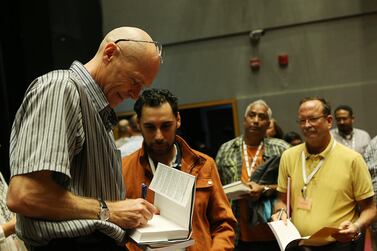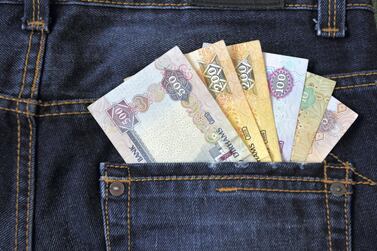The new year can be a time to show a little bit of resolution and finally fix the things in your life you didn't sort out in 2019.
That's easier said than done, especially when it comes to managing your money. The following 10 financial resolutions should help set you on course for a more prosperous 2020.
1. Take charge of your credit card bill
Many of us will have racked up large credit card bills over the Christmas and holiday period, and now they need your full attention.
Ambareen Musa, founder and chief executive of comparison site souqalmal.com, says anyone thinking of getting by with just making the minimum payments should think again. "What's the point of spending your hard-earned money on interest payments and letting expensive debt drag on for months and months?" she asks.
Now could be a good time to explore credit card balance transfer deals. “A card that charges zero interest on balance transfers for three to six months can be a great tool to help you cut out interest payments and speed up repayment,” says Ms Musa.
Remember to compare the processing fees on balance transfers before deciding which card to go with, Ms Musa added.
2. Review your financial commitments
Every year, UAE residents sign up to a series of annual financial commitments, including rental contracts, car insurance, health insurance, mobile phone contracts, TV subscriptions and so on. “Spend some time reviewing your annual expenses, carefully comparing your options and switching over to better alternatives where available,” says Ms Musa.
With car insurance, for example, compare features, benefits and exclusions across multiple insurance plans, to get the most value out of your premium, she adds.
3. Discuss your finances
Many people in a relationship find it difficult to discuss money with their partner, says Ben Barber, a UAE financial blogger at www.buildingwealthwisely.com. "We all have differing attitudes to money. It is an emotional subject as much as a numerical one."
He suggests setting aside some time to sit down together and talk about your long-term goals. “Your behaviour around money is often the most defining factor of your long-term financial success, so discuss your attitudes to money and be open about what things stress you out," Mr Barber says.
If you don't have a partner, have the discussion with yourself, he adds. “Will you need a new car this year, or are you planning on a holiday soon? Are you planning to move house, or increase your giving to a worthy cause? How much will that cost and how much do you need to save every month to finance it?”
4. Get more from your savings
Leaving your surplus cash in a current account is little better than hiding it under the mattress, as you will not earn any interest.
Eventually, inflation is going to slowly chip away at your savings, Ms Musa says, so make your savings work harder in 2020. “Invest in assets you understand well, be it bonds, stocks, property or gold.”
Deposit accounts at local UAE banks are a decent option she adds. “Quite a few have tiered interest rates, that can earn you more depending on your deposit balance and how long you are saving for.”
If you don't want to commit for a fixed term, you may get a higher return on variable rate online savings accounts or e-savings accounts. “Most leading banks in the UAE offer such accounts, with some advertising returns of up to 3 per cent a year,” Ms Musa says.
5. Set up an emergency fund
Do you have an emergency fund in place? If not, work out how much cash you need to cover three to six months of essential expenses, Mr Barber says. “For expatriates this is all the more essential, as your residency is often tied to employment," he says. "If you were to lose your job, how much cash would you need to fund your living expenses? How would you pay your rent, and would you have to leave the country?”
6. Figure out your goals
Think about what makes you truly happy, advises Demos Kyprianou, a board member of SimplyFI, a non-profit community of personal finance and investing enthusiasts in Dubai. “Spending sprees in Dubai malls don’t really help on that front,” he says.
Monitor spending with a free app for three months to get an idea of where your money is going. “Cut back on those sprees and redirect the money towards the goals that will really make you happy in life,” says Mr Kyrpianou.
In the short term, that could mean travel and other activities. “In the long-term it could mean retiring earlier and working for a charity or a cause you really believe in.”
Mr Kyprianou says cutting back on spending only works if you can put the money towards goals that make you happier. “Otherwise, you will forget those new year's resolutions in a few days," he adds.
7. Set yourself a budget
Now is the time to sit down and set yourself a budget. “The more accurate and realistic it is, the better, but even just ballpark figures of your monthly spending will give you an idea of what you could and should be saving this year,” says Mr Barber.
If you have written a budget previously, take this opportunity to review it, as your expenses or income may have changed. “If you don’t plan your spending, you’re setting off on your financial adventure without a map," he adds. "Failing to plan, might as well be planning to fail.”
8. Put it in writing
Once you have worked out your goals, write them down, Mr Barber adds. “Stick them somewhere you can see them regularly, for example, save them as a wallpaper in your phone or write them on a piece of paper in your wallet.”
If you are married, make sure you agree on them. “Sign them and stick them on the fridge if you need to, as a commitment to yourselves," he says. "That will help you stay the course as the new year's euphoria fades.”
Building wealth is a marathon, not a sprint, Mr Barber says. “Treat the new year as a distance marker in the road, where you refresh and refocus on your goals for the journey ahead,” he adds.
9. Assess your property portfolio
Analyse whether your mortgage is still a good deal, says Chris Battle, who runs The Property Hub Meetup in Dubai. "This is particularly important if, say, you have a fixed rate that is set to expire shortly," he says.
Before switching out of an existing mortgage, watch out for any exit fees or application charges on your new deal.
If you have investment properties, check they are still profitable and you have appropriate insurance and a good managing agent where necessary, Mr Battle says. "Anybody considering buying in the UK should start their search sooner rather than later, as the new Conservative government has suggested introducing an additional 3 per cent stamp duty surcharge for overseas buyers, regardless of whether they are investing or looking to occupy the property,” he adds.
10. Start saving regularly
Stuart Ritchie, director of wealth advice at AES International, recommends setting up a regular investment strategy, to build your future wealth. “This makes it as painless, realistic and automated as possible, which means you are more likely to keep at it,” he says.
This is also a good time to check your portfolio is invested in the right place. “You want a balance of low-cost, globally diversified funds giving you the best opportunity to maximise the performance of the entire market while safeguarding against sudden blows,” Mr Ritchie adds.
That way you don’t have to worry about timing the market or short-term volatility, and just leave your money to grow over the long term.










